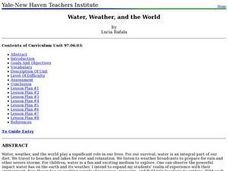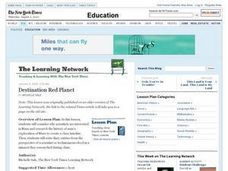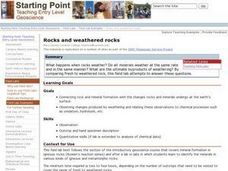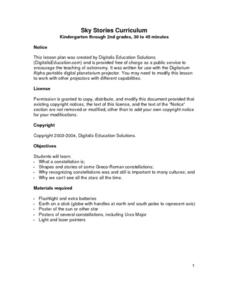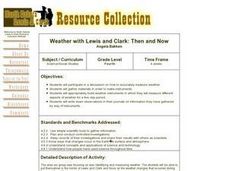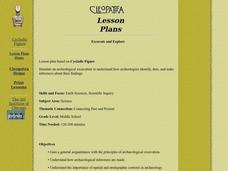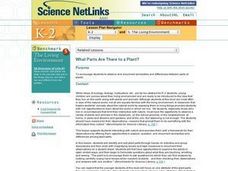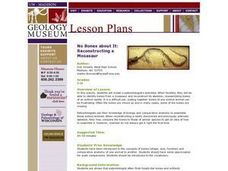Curated OER
Water, Weather, and the World
Students in a special education classroom examine the role of weather and water in their lives. Each day, they add a symbol for the weather outside and identify the proper activities for the weather on that day. In groups, they...
Curated OER
Destination Red Planet
Students explore reasons why people are interested in exploring other planets. After reading an article, they identify developments in the mission to Mars. Using the internet, they research the history of exploring Mars and create a...
Curated OER
Bird Up
Third graders identify basic physical and behavioral characteristics of birds and how they adapt to their environments. To organize and share scientific information with peers. They discuss similarities and differences among birds....
Curated OER
Rocks and weathered rocks
Students connect rock and mineral formation with the changes rocks and minerals undergo at the earth's surface. They observe changes produced by weathering and relating these observations to chemical processes such as oxidation,...
Curated OER
Sky Stories
Students are introduced to the branch of science known as astronomy. They discuss stars and constellations and then view the night sky using a portable digital planetarium projector. They identify a variety of constellations and...
Curated OER
Nitrogen Cycle
Students identify the main concepts and ideas of the nitrogen cycle.
They review key concepts covered up to this point in ecology including food chains, food webs, energy pyramids, and bio-geochemical cycles.
Curated OER
Exploring the World's Geography
Students discuss the seven continents of Earth and the diverse geography. After discussion, they create their own paper-mache globes which properly display all seven continents, the equator, and the prime meridian. They conduct research...
Curated OER
America's Favorite Landmarks
Learners research using Google Earth a variety of websites to explore America's most prominent and famous buildings. They then compare and contrast architectural styles and write a position paper defending or arguing against their chosen...
Curated OER
The Water Cycle
Third graders investigate water formations by conducting an experiment. In this water properties lesson plan, 3rd graders utilize pie tins, sponges and salt shakers to create an evaporation and saturation experiment. Students collaborate...
Curated OER
Rover Races
Students identify the challenges encountered by astronauts in operating a planetary rover. In this space science activity, students create a rover using their team members. They follow a command sequence from the driver and navigate...
Curated OER
Growing plants
Students explore plants and recognize that they are living things that require light and water to grow; students identify, name and match the parts of plants.
Curated OER
Weather with Lewis and Clark: Then and Now
Fourth graders discuss how to accurately measure weather, gather materials in order to make instruments, and build weather instruments in which they measure and record different aspects of weather for a five-day period.
Curated OER
Ourselves
Students identify the main parts of the human body. They point to various parts of their own body, cut out pictures of humans and animals and sort them into the two categories, discuss the differences between animals and humans, and...
Curated OER
Micro-Organisms
Students investigate micro-organisms with an on line activity. In this micro-organism on line lesson plan, students identify bacteria, viruses and fungi projected onto a white board. Students work in groups and use a computer and an on...
Curated OER
Interdependence and Adaptation
Fifth graders construct a food web to illustrate how animals and plants are interdependent. In this interdependence lesson, 5th graders identify how consumers, producers, herbivores, carnivores and predators are related in a habitat....
Curated OER
Excavate and Explore
Students simulate an archeological excavation to explain how archeologists identify, date, and make inferences about their findings. They explain the importance of spatial and stratigraphic contexts in archaeology.
Curated OER
Extra! Extra!
Students describe how plants and animals depend on each other. They see how living and nonliving environments change over time. They identify ways in which humans have changed their environment and the effects of those changes.
Curated OER
What Parts Are There to a Plant?
Students identify and sort plant parts through hands-on activities and group discussions and then work with magnifying lenses and tape measures to document their observations on a student sheet.
Curated OER
No bones About It -A Mosasaur
Students model a paleontologist's activities. They identify dinosaur bones and reassemble them into a skeleton of an extinct reptile.
Curated OER
Sharks At Risk Viewing Guide
Students complete a worksheet while viewing a film about sharks. They examine the reasons for overfishing of the oceans. They identify predator-prey relationships as well.
Curated OER
Employee Behaviors
High schoolers demonstrate knowledge of employee behaviors that promote career success. They demonstrate knowledge of career opportunities by identifying attitudes and behaviors that strengthen the individual work ethic and promote...
Curated OER
Renewable Energy and
Students identify and explore renewable energy options and then research, develop and install a renewable energy system in their school or community. Students identify the use of renewable energy sources in the north, demonstrate their...
Curated OER
Canada's Natural Regions and Their Varied Characteristics
Students examine Canada's six natural regions, with all their underlying human and economic activities, identify specific characteristics of each region, discover economic and human riches of natural regions and, create presentations to...
Curated OER
How To Make an Apple Pie And See the World
Students define and discuss global interdependence. They read How to Make an Apple Pie and See the World and keep a list of the countries visited during the story and identify all of the productive resources and natural resource...


